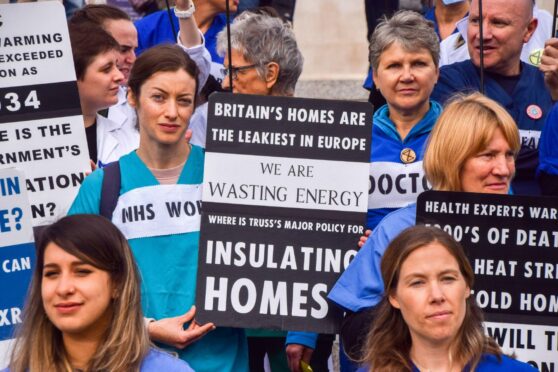
Only half of a multimillion-pound fund to improve home insulation in some of Scotland’s poorest areas was spent last year, we can reveal.
The Scottish Government allocated £64 million to councils to help people improve their homes and lower energy bills in the past year but just £33.7m was spent.
The underspend comes as families face huge increases in their energy bills and as world leaders meet at the Cop27 summit in Egypt to discuss how to tackle climate change.
Councils and the Scottish Government blamed Covid restrictions for the failure to spend all of the cash. However, in the previous financial year, when there was a full lockdown for many months, councils spent more – £35.8m.
Frazer Scott, of fuel poverty charity Energy Action Scotland, said: “It is damning that prior to an energy crisis, delivery consistently fell below budget allocations.”
Official estimates show 900,000 of Scotland’s 2.5 million households are in fuel poverty – spending 10% of income on energy. Despite this, just four Scottish councils – Midlothian, South Ayrshire, Stirling and West Dunbartonshire – spent all of their allocated funding under a programme called Area Based Schemes in 2021/22.
Glasgow spent £1.3m and reported an underspend of £4.7m, while Edinburgh spent £2.6m and reported an underspend of £2.3m. Perth and Kinross spent just £23,000 and failed to spend of £1.9m while Aberdeen spent £53,000, reporting a £2.5m underspend and Renfrewshire spent £92,400 and reported an underspend of £1.7m.
North Lanarkshire spent £107,000 and underspent £2.6m and Dundee, which spent £153,000, and reported an underspend of £1.7m.
Friends Of The Earth Scotland’s head of campaigns, Mary Church, said making homes more energy-efficient would cut both heating bills and climate pollution. She said: “People trapped in damp, draughty homes will be livid when they see £30m in public money that could improve their lives is going unspent. Councils and the Scottish Government need to get their act together quickly to identify why this colossal failure is taking place and how they will resolve it.”
Dr Keith Baker, research fellow in fuel poverty and energy policy at Glasgow Caledonian University and co-founder of The Energy Poverty Research initiative, said: “There is a systemic problem that goes all the way to the top. The rules about how the local authorities can spend that money are often restricted to measures many people already have, such as cavity-wall and loft insulation, which may not be suitable for their properties, or that they simply don’t want. For these and other reasons, such as rising costs of materials, councils are often left jumping through unnecessary hoops.”
Renfrewshire Council, which upgraded just 11 properties, said its programme was hit by issues that affected the construction industry as it emerged from restrictions put in place during the pandemic, including delays with material supplies and fluctuating labour force levels.
North Lanarkshire Council said it only spent £107,000 because house owners have to contribute up to £2,600, which it said is not realistic during a cost-of-living crisis.
But Stirling Council, which spent all of its allocation upgrading 200 properties, said it successfully delivered the scheme because it has well-maintained housing stock records. The council said: “We were able to easily identify properties that qualified. We are currently also on target to achieve full spend in the next financial year.”
Conservative shadow energy secretary Liam Kerr said: “There isn’t a business or household in Scotland who is not worried about soaring energy bill costs so the SNP-Green government needs to get its finger out and ensure money set aside for fighting fuel poverty reaches those who need it most.”
The Scottish Government said: “Area Based Schemes have so far helped over 104,000 fuel-poor households. Spending by some councils last year was less than planned due to issues with availability of staff and materials and also the knock-on effect of the Covid-19 pandemic. We are working hard to strengthen delivery of our Area Based Schemes.”
Meanwhile, Labour MSP Alex Rowley is to launch a bill forcing housebuilders to meet new minimum standards, including increased insulation, and former Archbishop of Canterbury Dr Rowan Williams has urged politicians to insulate more homes.

Enjoy the convenience of having The Sunday Post delivered as a digital ePaper straight to your smartphone, tablet or computer.
Subscribe for only £5.49 a month and enjoy all the benefits of the printed paper as a digital replica.
Subscribe